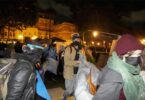BROOKFIELD (AP): From the Chinese restaurant he runs in the western suburbs of Milwaukee, Charles Yee has watched with alarm this week as Europe confronts the greatest threat to its peace and security since the end of World War II. But, at least for now, he’s more troubled by challenges at home.
As the pandemic stretches into its third year, the 62-year-old Brookfield, Wisconsin, native is trying to keep his business running amid a staffing shortage. Disruptions to the supply chain make it hard to keep basic supplies like to-go containers on hand. Perhaps nothing hits Yee harder than the rise in prices fueled by inflation, which makes everything more expensive. He would like a full day off at some point.
The ever-present headwinds make Russia’s invasion of Ukraine seem like a distant problem to Yee, who is a Republican. He’s not excusing Russian President Vladimir Putin’s norm-shattering efforts to topple the government of a neighboring democracy, threatening the lives of civilians in the process. But his own persistent hurdles resonate more deeply to him.
“It’s not my top priority,” Yee said of the invasion. “I’m just kind of, sort of — you know — getting by.”
In one of America’s most politically divided states, Yee is not alone. More than a dozen interviews with voters across the demographic and political spectrum on the eve of and immediately after the Russian attack suggest a broad focus on domestic issues, particularly the economy. While Democrats were often quicker to express concern for Ukrainians, they were also reluctant to become too engaged in an overseas conflict.
Harshman Sihra, an 18-year-old Democrat, said he wants “everybody to be safe and healthy.”
“But we’re really concerned about American citizens first,” he said. “So that’s great, but us first.”
That sentiment poses a challenge for Democrats in a critical election year. President Joe Biden has cast Putin’s aggression as a “contest between democracy and autocracy.” But if he hopes for his party to prevail in November, he must also keep talking about issues that are more tangible to voters.
That’s especially true in a place like Wisconsin, which is home to closely watched races for governor and Senate this year. In one of his first trips outside of Washington after next week’s State of the Union address, Biden is expected to travel to Superior, Wisconsin, to highlight the on-the-ground impact of his massive infrastructure spending legislation.
The president is balancing the competing priorities as many in the U.S. are deeply skeptical of foreign entanglements after two decades of failures overseas, including the Iraq War and the botched withdrawal from Afghanistan. Just 26% say the U.S. should have a major role in the Russian conflict, according to a poll released this week from The Associated Press-NORC Center for Public Affairs Research.






